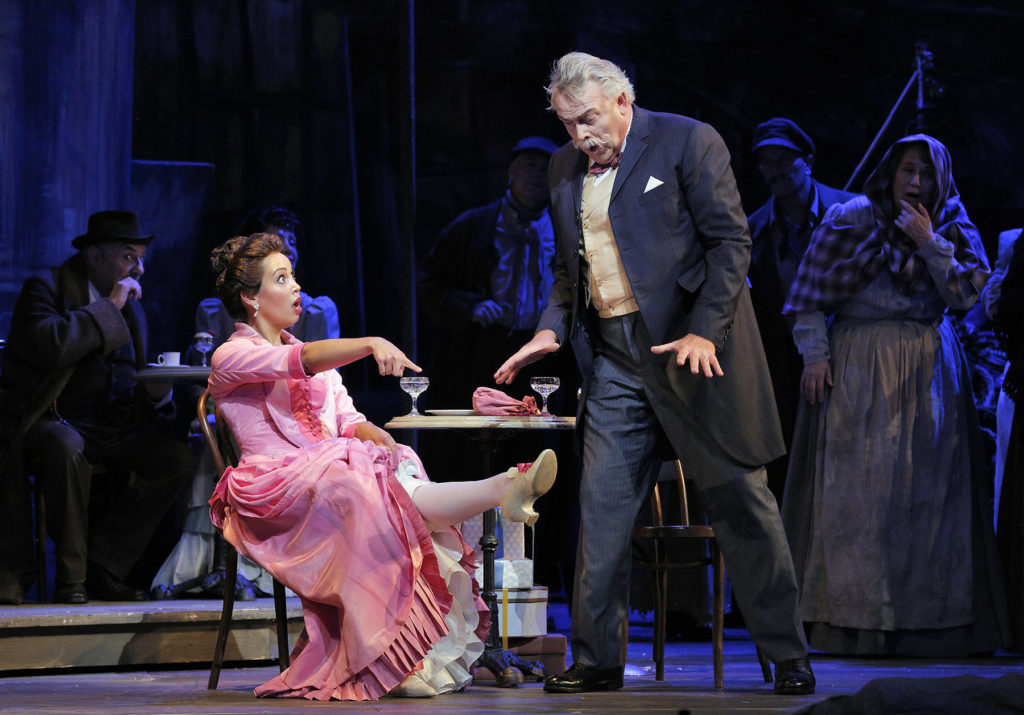
San Francisco Opera’s La Boheme, photo by Cory Weaver
Since Harvey Weinstein’s exposé in 2017, the #MeToo movement has become a major social force that condemned and exposed sexual harassment and abuse of women by men in positions of power. As a college professor who teaches opera, where many iconic plots are based on sexual harassment and abuse of women by men in positions of power: Madama Butterfly, Rigoletto, Don Giovanni, Le Nozze di Figaro, La Boheme, to name just a few – I am faced with a growing responsibility of addressing this issue.
How then do I approach teaching the standard opera repertoire to my young college students? It seems that glossing over the misogyny and female abuse in operatic works is no longer an option. Neither is it feasible to omit the classic repertoire, where treatment of women offends some of the modern sensibilities. The great power, genius and educational benefit of those works cannot be argued.
As a genre, opera is notoriously difficult to dissect. We know that its power lies in the unity of music, text, drama, orchestration and everything else that goes into creating the opera experience. The minute we separate the components and try to analyze them one by one, we lose the essence of the whole.
As a modern, #MeToo woman I can’t reasonably explain why Gilda would sacrifice her own life to save her rapist, the Duke of Mantua, but opera is not a reasonable experience. As Tchaikovsky put it, “People in their right mind don’t break into a song”. So, when that Rigoletto trio breaks out, my whole being knows that Gilda must die. Is it heroic? Is it dreadful? Is it insane? Who knows? There is no one answer, but it is very powerful and is one of the greatest operatic moments of all time. Hence this is what I feel we need to discuss with the students:
- Firstly, what is the nature and purpose of opera?
I feel that some of the popular dramatic series can be a good analogy here. “Game of Thrones” for example is an extremely popular TV show, filled with all kinds of inappropriate horrors. Like opera, it is created for entertainment and delivers very powerful moments. It is an exaggerated reality that entertains and somehow tells us something important about the complex universe. It is then important to not overpoliticize our operas and remember that even great art is still entertainment. Would we buy tickets to see a politically correct Rigoletto? Would we want to censure “Game of Thrones”?
Advertisement (article continues below):
- Is the misogyny more than a dramatic device?
Don Giovanni and the Duke of Mantua are some of the most notorious female abusers in operatic literature. Their behavior towards women makes for a sordid entertaining experience, which can sometimes offend and shock a young generation of students and opera goers. Do we then condemn them as irrelevant relics and stop producing these works? Absolutely not! That sort of behavior has happened, is happening and will continue to happen if we start to indulge the puritan ideology that insists on political cleansing of college productions. Besides, let’s also remember that the works themselves condemn these men and elevate the women.
- Historical, liberal treatment of female opera artists
It is another paradox of the operatic genre, that being such a conservative art-form, it’s treatment of female singers has always been liberal and ahead of its time. A hundred, two hundred years ago, when most women did not have careers, female opera artists were career professionals. They were valued, admired and they travelled the world centuries before women in other professions got to do the same.
- What does it all mean?
It means that as always, knowledge is power. We need to encourage our students to research their characters: what were the current politics, the inspiration, the purpose and the reception of the work? What is the opera’s message as a whole? How does it relate to us today? Some of these questions are easier to answer than others, some are an open discussion and some may take a lifetime of reflection, research and experience, but that is why we love opera. It is complex, powerful, exaggerated and it defies empirical analysis.
- Pre-concert talks
I feel that this simple tool cannot be underestimated. While we can do research and have conversations with our students, we also have a responsibility towards our audiences. I feel that any college production should have a pre-concert talk with Q&A. We cannot miss this opportunity to educate, reach out and befriend our audiences. We can for example, address the issue of misogyny and answer questions on how we approached it in the production. This also creates a forum where we can discuss, defend and explain our production choices.
Like “Game of Thrones,” opera is not for the faint-hearted, the squeamish or the puritans. It is an exaggerated universe where the most unreasonable characters stumble through the most unreasonable plots that portray passion, lust, love, betrayal, sex, murder and everything in between. The power of human voice, text, music and drama all combine to overwhelm and enrich us. In the end, somehow it all makes sense, but it is the professors’ job to ensure that our students and audiences can have the same meaningful, enjoyable experience.


